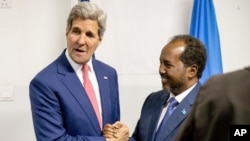U.S. Secretary of State John Kerry arrived in Somalia on Tuesday with promises of reopening the U.S. embassy in the capital, Mogadishu, and broadening Washington's assistance to Somalia's security forces.
Kerry's unannounced visit, the first by a U.S. secretary of state, reflects Washington's efforts to push back the al-Shabab terrorist group and strengthen its presence in the Horn of Africa.
"We all have a stake in what happens here in Somalia. The world cannot afford to have places on the map that are essentially ungoverned," he said during his brief stopover.
Somalia has spent a decade fighting the al-Qaida-linked al-Shabab. The clan-based group has been behind numerous piracy attacks and gun-and-bomb assaults, both in Somalia and in neighboring Kenya.
Somalia's internal political divisions had crippled its fight against al-Shabab. Kerry said the Mogadishu government, with the help of the U.S., the United Nations and the African Union force, had made progress on unifying the nation and pushing al-Shabab out of major population centers.
"Somalia's return to effective government is a historic opportunity for everybody to push back against extremism and to empower people in a whole country to be able to live the promise of their nation," the secretary said.
Kerry met with Somalia's President Hassan Sheikh Mohamud as well as Prime Minister Omar Abdirashid Ali Sharmarke. The meetings were held inside an airport complex protected by walls of sandbags.
U.S. exit from Somalia
The United States pulled its diplomatic presence and forces out of Somalia in 1993, after militiamen shot down a U.S. Black Hawk helicopter, killing 18 soldiers whose bodies were then dragged through the streets. The al-Shabab extremists emerged out of the civil war chaos of that time.
But there is concern that the Somali government is floundering, said Vanda Felbab-Brown, a senior fellow at the Brookings Institution, a public policy research group in Washington. She said Kerry's visit underscored Washington's desire to not only push back the militants who have been on the offensive, but also to consolidate regional counterterrorism efforts and spur Somalia's political leadership toward better governance.
It is, she said, a pivotal political and counterterrorism moment. "Without a more inclusive, competent and actually governing government, one can kill many militants and many others will simply come up out of frustration," she said. "So, it is also managing the domestic political issues in Somalia that spurred Kerry's visit."
State Department spokesman Jeff Rathke acknowledged that the al-Shabab militants are a threat.
"Al-Shabab remains a dangerous terrorist organization," he said. "They've carried out attacks in Kenya, most recently, and so that is an issue of continued vigilance and concern by the United States, by Somalia, and by our international partners."
Somalia Foreign Minister Abdusalam Hadiye Omer told VOA that Kerry's visit proved his country has moved forward.
"It's an historic visit. It's the first time that a U.S. secretary of state visits Somalia's capital, Mogadishu," he said. "This shows the world that the Somalia government is functioning and that Somalia has turned around and is open for business, and that we are rebuilding Somalia."
Challenges for AMISOM
But while al-Shabab no longer controls major cities in Somalia, Felbab-Brown said forces of the African Union mission in Somalia, or AMISOM, face a tough year ahead. A stronger U.S. presence could help them with needed logistical support.
Al-Shabab "no longer controls major cities, but they control most of the access routes," she said. "They prevent AMISOM from effectively moving throughout the territory, and of course anyone else, including the Somali government."
Kerry said the country's progress has opened the door for the U.S. to begin setting up a diplomatic mission in Mogadishu. The U.S. mission to Somalia is currently based at the embassy in neighboring Nairobi, Kenya.
In February, President Barack Obama nominated Katherine Dhanani to serve as the first U.S. ambassador to Somalia since 1991. Dhanani has yet to be approved by the U.S. Senate.
Kerry on Monday met with Kenyan President Uhuru Kenyatta to discuss ways to more effectively deal with threats posed by al-Shabab. The militants have killed hundreds of civilians in Kenya. In 2013, they attacked shoppers in a Nairobi mall, killing 68 people. This year, they stormed Garissa University College and shot dead 147 students.
VOA's Pamela Dockins, Cindy Saine and Somali service contributed to this report.





